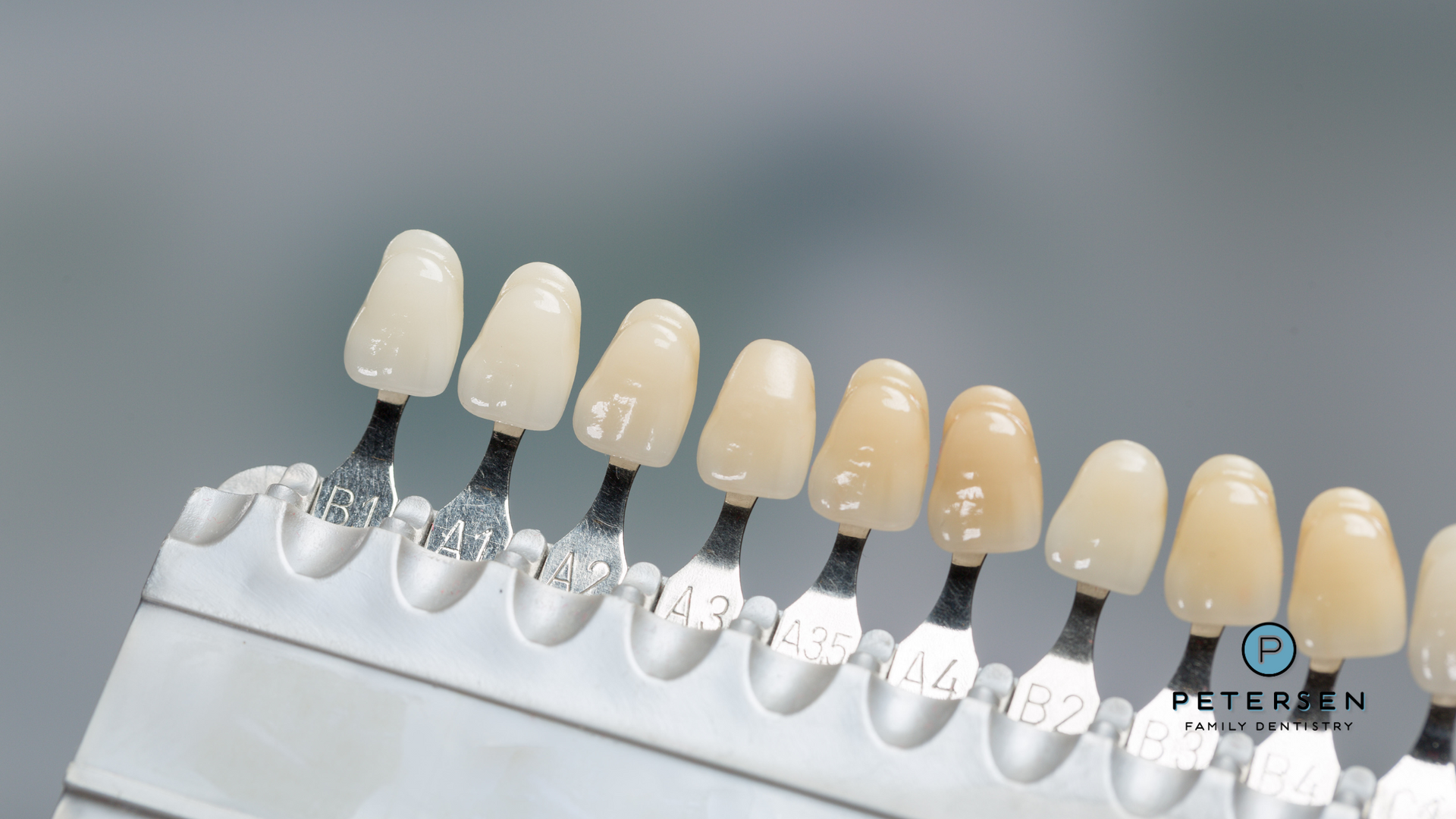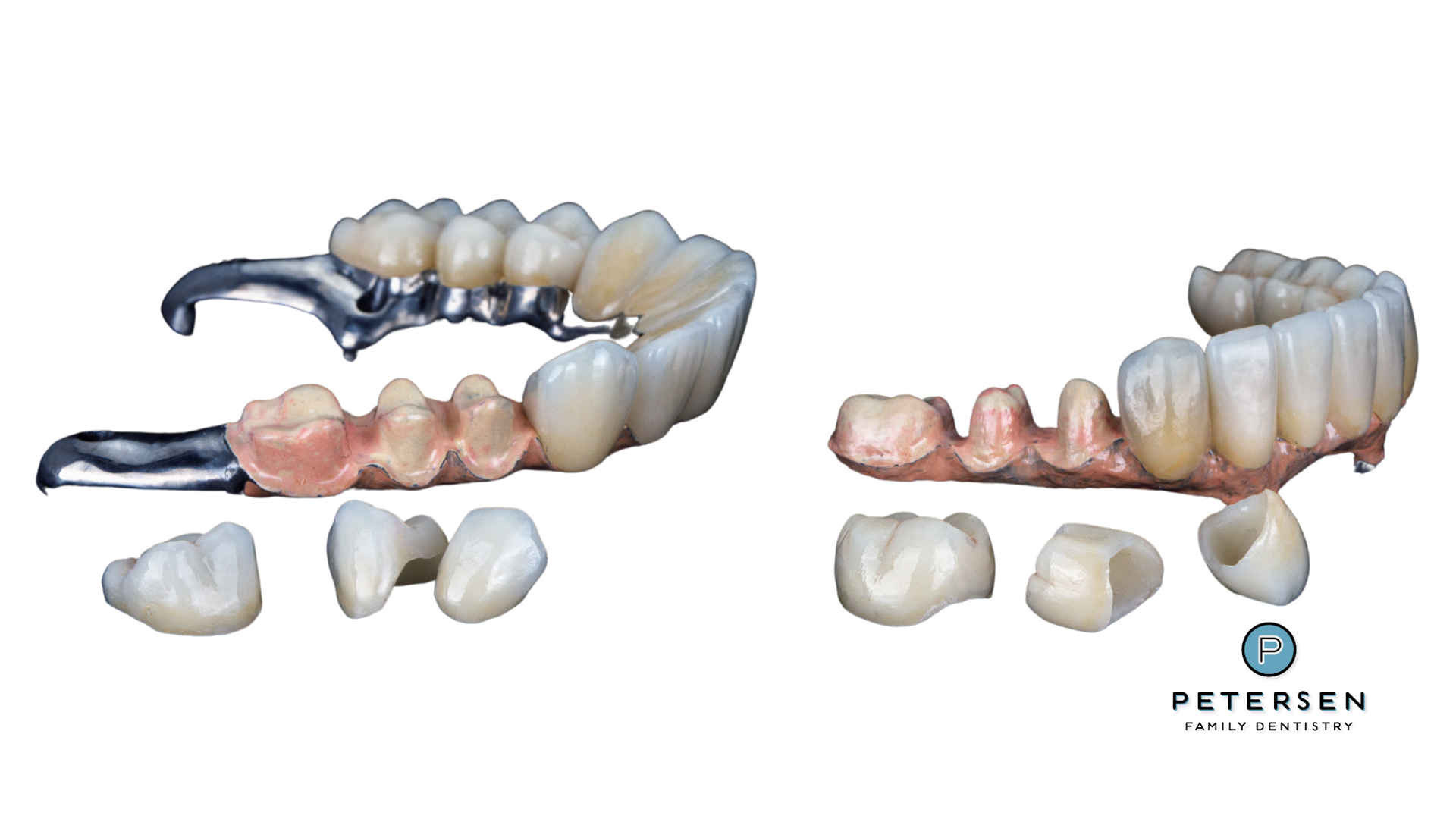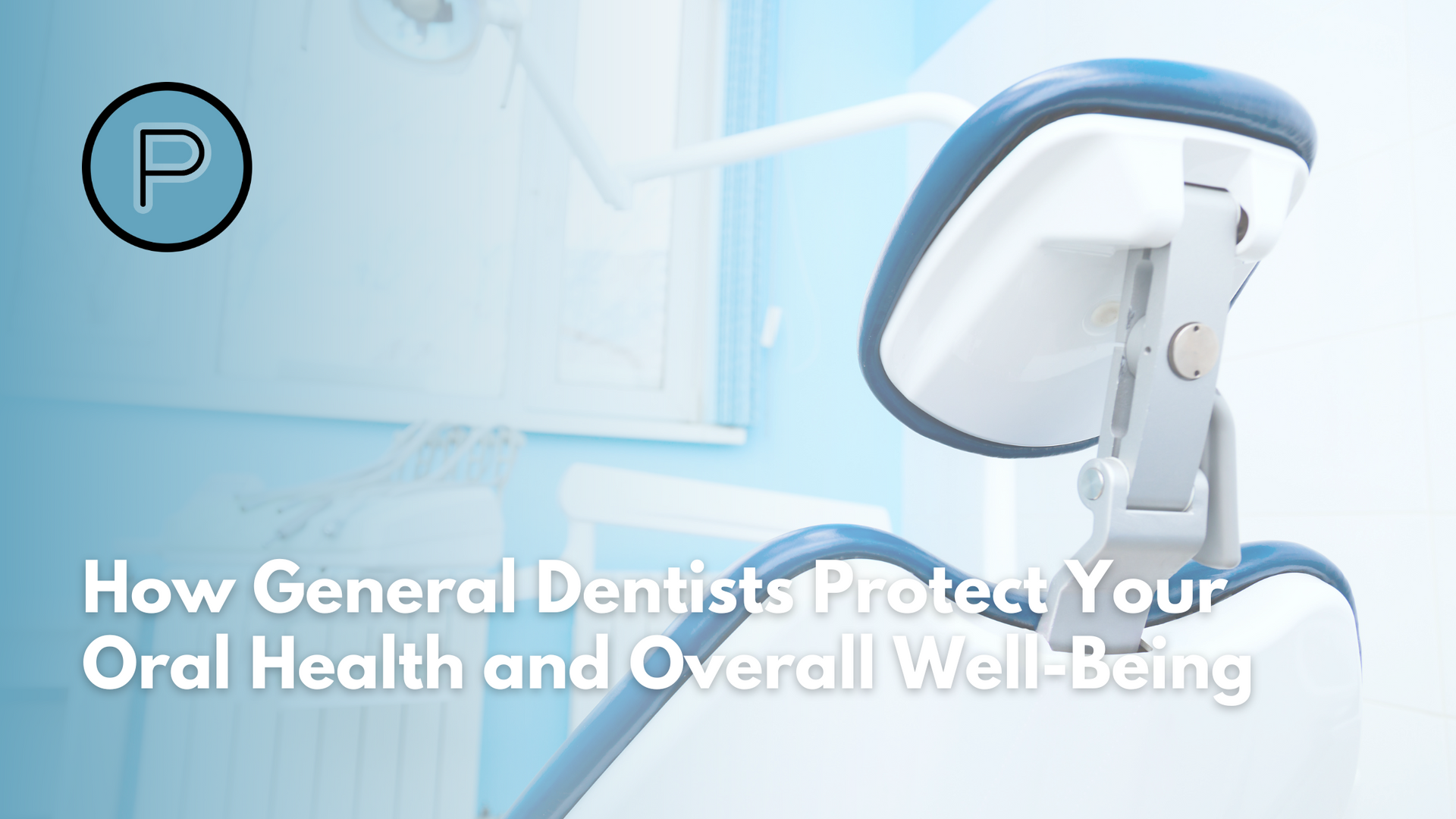Dental Crowns: Treatment, After Care, and Longevity of the Procedure

Dental crowns are a common treatment for a variety of dental issues, including cracked or broken teeth, severe decay, and cosmetic concerns. They are designed to improve the tooth's appearance, strength, and functionality. There are several different types of dental crowns available, each with its own advantages and disadvantages. In this blog post, Petersen Family Dentistry will provide you with everything you need to know about dental crowns.
What are Dental Crowns?

Dental crowns, often referred to as caps, are dental restorations used to cover and protect a damaged or weakened tooth. These tooth-shaped caps are commonly made of materials such as porcelain, ceramic, or metal alloys, and are customized to fit over your natural tooth, restoring its appearance, strength, and functionality. At Petersen Family Dentistry, we commonly recommend dental crowns for various situations, including:
- Protection of Weak Teeth: Dental crowns are used to protect teeth that have been weakened due to decay or fractures.
- Large Fillings: If you have a tooth with a substantial filling, a crown can help support and reinforce it.
- Cosmetic Enhancements: Crowns can cover discolored or misshapen teeth, improving your smile's aesthetics.
- Support for Dental Bridges: Crowns are crucial components of dental bridges, helping to anchor the bridge in place.
- Dental Implants: They are used to cover and protect dental implants, which replace missing teeth.
With a dental crown, you can restore the shape, size, and strength of a damaged tooth.
Types of Dental Crowns

There are several types of dental crowns available, each with its own unique set of advantages and disadvantages. Some common types of crowns include:
Porcelain Crowns
Porcelain crowns are a popular choice because they closely resemble natural teeth. These crowns are made of a ceramic material that matches the color of your existing teeth. Porcelain crowns are a great option for front teeth, as they are very aesthetically pleasing.
Metal Crowns
Metal crowns are made of gold, platinum, or base-metal alloys. These crowns are very strong and durable, making them a good choice for back teeth that endure a lot of biting and chewing. Metal crowns are also less likely to chip or break than other types of crowns.
Porcelain-Fused-to-Metal (PFM) Crowns
PFM crowns are made of a combination of porcelain and metal. The metal provides strength and durability, while the porcelain provides a natural-looking appearance. PFM crowns are a good option for both front and back teeth.
All-Ceramic Crowns
All ceramic crowns are made entirely of ceramic material, making them a great option for people with metal allergies. These crowns are also very aesthetically pleasing, as they can be matched to the color of your existing teeth.
Zirconia Crowns
Zirconia crowns are made of a very strong ceramic material that is highly resistant to cracking and chipping. These crowns are a great option for people who grind their teeth, as they are very durable.
The right dental crown for you will depend on your dental needs. Our dentists at Petersen Family Dentistry in Broomfield, Colorado will help you choose the right type of crown for your specific needs.
The Dental Crown Procedure

The process of getting a dental crown typically involves several steps, including preparing the tooth, taking impressions, and placing a temporary crown while the permanent one is being made.
When you visit our dentist, Dr. Derek Petersen at Petersen Family Dentistry for a dental crown, the process can typically be completed in two appointments.
The First Appointment
During the first appointment, the tooth will be prepared for the crown. This involves removing any decay, shaping the tooth, and taking impressions of the tooth and surrounding teeth. The impressions will be sent to a dental lab where the crown will be custom-made to fit the patient's tooth. While the permanent crown is being made, a temporary crown will be placed on the tooth to protect it. This temporary crown is made of acrylic and is not as strong as the permanent crown, so you should be careful not to chew hard or sticky foods on that side of the mouth.
The Second Appointment
Once the permanent crown is ready, you will return for the second appointment where the temporary crown will be removed, and the permanent crown will be placed on the tooth. Our dentist, Dr. Petersen will check the fit and make any necessary adjustments before cementing the crown in place.
You can expect some sensitivity and discomfort after the procedure, but this should subside within a few days. It is important to follow any aftercare instructions to ensure proper healing and longevity of the crown. Overall, the treatment process for dental crowns is straightforward and can provide long-lasting results for patients with damaged or decayed teeth.
Post-Treatment Care for Dental Crowns
After getting a dental crown, it is important to take proper care to ensure its longevity and prevent any complications. The following are some tips for post-treatment care:
- Avoid eating hard or sticky foods for the first few days after getting a crown to allow it to be fully set.
- Brush and floss regularly to maintain good oral hygiene. Be sure to pay extra attention to the area around the crown to prevent plaque buildup.
- Use a mouthguard if you grind your teeth at night to prevent damage to the crown.
- Schedule regular dental check-ups with our team at Petersen Family Dentistry to ensure the crown is still in good condition and functioning properly.
If any issues arise, such as pain or sensitivity, contact our dental team at Petersen Family Dentistry immediately to schedule an appointment. With proper care, dental crowns can last for many years and provide a durable solution for damaged or decayed teeth.
How Long Do Dental Crowns Last?

The lifespan of your dental crown depends on several factors, including the material used, your oral hygiene habits, and the amount of wear and tear the crown is subjected to. Here's a breakdown of the different types of crowns and how long they can be expected to last:
- Porcelain-fused-to-metal (PFM) crowns: These crowns are made from a metal base with a porcelain overlay. They are strong and durable, but over time, the porcelain can chip or wear away, revealing the metal underneath. PFM crowns typically last between 10 and 15 years.
- All-ceramic crowns: These crowns are made entirely from ceramic materials, which makes them more aesthetically pleasing than PFM crowns. They are also less likely to cause an allergic reaction in patients. All ceramic crowns can last anywhere from 15 to 20 years.
- Gold crowns: Gold crowns are the most durable type of crown and can last up to 30 years or more. However, they are not as aesthetically pleasing as other types of crowns, which may make them less desirable.
To ensure the longevity of a dental crown, you need to practice good oral hygiene habits, such as brushing and flossing regularly and avoiding hard or sticky foods that could damage the crown. Regular dental check-ups and cleanings can also help to prevent any issues from developing with the crown. In some cases, a dental crown may need to be replaced if it becomes damaged or worn out.
Alternatives to Dental Crowns

While dental crowns are a popular treatment option, they are not the only option available. Understanding the differences between these options can help you make an informed decision about which treatment is right for you.
Dental Fillings
Dental fillings are one of the most common alternatives to dental crowns, especially for smaller cavities. They are a straightforward and cost-effective solution for repairing teeth damaged by decay or minor fractures. There are two main types of dental fillings:
- Composite Fillings: These are tooth-colored fillings made from a resin material that can be matched to the natural color of your teeth. They provide a more aesthetic option for restoring teeth in visible areas of the mouth.
- Amalgam Fillings: These are silver-colored fillings made from a mixture of metals, including silver, mercury, tin, and copper. They are durable and cost-effective but less aesthetically pleasing.
Dental fillings can last anywhere from 5 to 15 years, depending on factors like the material used and your oral hygiene practices. Proper care and regular dental check-ups are essential for their longevity.
Inlays and Onlays
Inlays and onlays are another alternative to dental crowns and are often used to treat larger cavities or teeth with more extensive damage. They are custom-made restorations created in a dental lab and are typically made from materials like porcelain, composite resin, or gold. Inlays fit inside the cusp tips of a tooth, while onlays extend over one or more of the cusps. They are known for their durability and ability to preserve a significant portion of the natural tooth structure.
Inlays and onlays are known for their longevity, with an average lifespan ranging from 10 to 30 years. Their durability makes them a favorable alternative to crowns in many cases.
Dental Bridges
Dental bridges are used to replace missing teeth and can be a suitable alternative to dental crowns in some cases. A dental bridge consists of two dental crowns (called abutments) on either side of a false tooth (pontic) to bridge the gap left by a missing tooth. Bridges can provide both functional and aesthetic benefits, restoring your ability to chew and speak properly while improving your smile's appearance.
Dental bridges typically last around 10 to 15 years or more with proper care. Regular dental check-ups and good oral hygiene practices help extend their lifespan.
Dental Implants
Dental implants are a more permanent and comprehensive solution for replacing missing teeth. They consist of a titanium implant that is surgically placed in the jawbone, topped with an abutment and a prosthetic crown. Dental implants are highly durable, natural-looking, and can last a lifetime with proper care. While they may involve a more extensive and longer treatment process than dental crowns, they offer a long-term solution that preserves jawbone health.
Dental implants, when well-maintained, can last a lifetime. They are known for their exceptional longevity, making them a valuable investment in your oral health.
Porcelain Veneers
Porcelain veneers are ultra-thin, custom-made shells that are bonded to the front surfaces of teeth. They are primarily used for cosmetic purposes to improve the appearance of teeth with minor imperfections, such as stains, chips, or slight misalignment. Veneers can provide a dramatically improved smile without the need for extensive tooth preparation.
Porcelain veneers typically last 10 to 15 years or longer with proper care. Regular dental check-ups are crucial to monitor their condition.
Tooth Bonding
Tooth bonding involves applying a tooth-colored composite resin directly to the tooth's surface. It's a versatile and cost-effective alternative to dental crowns, commonly used to repair minor chips, cracks, or gaps. Bonding can also be used for cosmetic enhancements, such as changing the shape or color of a tooth. Tooth bonding typically lasts between 5 to 10 years, but it may require touch-ups or replacements over time.

Dental crowns are versatile and invaluable solutions for a range of dental issues, offering both restorative and cosmetic benefits. They can transform not only your smile but also your overall quality of life, and with proper care, they can last for many years, providing you with a confident and healthy smile. Understanding the various types of crowns and their respective advantages allows you to make informed choices based on your unique needs and preferences.
At Petersen Family Dentistry, we are committed to providing you with top-notch dental care, including expertly crafted dental crowns tailored to your unique needs. Our team of experienced professionals is dedicated to enhancing your smile's beauty and function while ensuring your lasting oral health. Don't wait to experience the transformative benefits of dental crowns. Contact us today to schedule your consultation and take the first step towards a healthier, more confident smile.


We are the local Broomfield dentist near you!
Feel Good Dentistry
Request Your Next Dental Appointment
We look forward to seeing you soon!
Please note, we will try our best to accommodate your schedule.
Thank you so much for contacting our dental practice. While we strive to respond to all inquiries right away, we may be away from the desk helping a patient or out of the office. We will do our best to reach back to you shortly.
Please note, if this is a dental emergency, it would be best to call our practice as this is the fastest way to reach us (720) 308-9798.
Please try again later
Broomfield Dentist
We understand that trying to find a nearby dentist you can trust is difficult, that is why we make it easy for you to work with us.
(720) 308-9798
3303 W 144th Ave, Suite 100
info@pfamilydentistry.com
Helpful Links
Dental Practice Hours
- Monday
- Closed
- Tuesday
- -
- Wednesday
- -
- Thursday
- -
- Friday
- -
- Saturday
- Closed
- Sunday
- Closed
All Rights Reserved | Petersen Family Dentistry
All Rights Reserved | Petersen Family Dentistry
Dentist Website Diagnosed, Treated, and Cured by Dr. Marketing Inc

